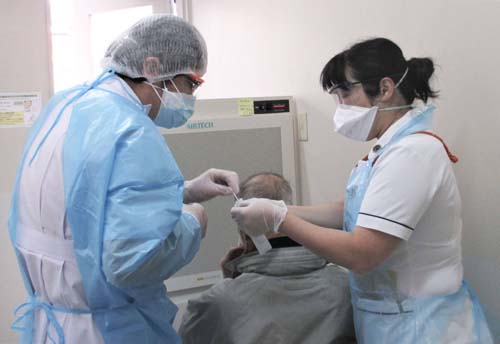
Japan to start random PCR testing to gauge infections in cities
Tokyo: Japan will commence random mass testing as early as March as part of efforts to ascertain the extent of the novel coronavirus’ spread in city areas, according to government sources.
The central government is aiming to conduct up to several thousand polymerase chain reaction (PCR) tests per day in Tokyo, Osaka and other metropolitan areas seeing a high number of cases, with the goal of using the information to develop effective virus prevention measures, the sources said.
In contrast with local government testing that only targets people who show symptoms or have had close contact with infected individuals, random people will be tested to determine how much the virus has spread in a particular city.
The costs of the tests, which will be carried out by contracted private companies, will be fully covered by the central government. The tests are expected to be conducted at airports, as well as places where crowds tend to gather such as city centers, companies and universities.
In addition to on-site collection of mucus and saliva samples, specimens collected using testing kits will also be accepted by mail. The results will be released to individuals but will also be used anonymously in statistical data.
The government also plans to collect information on Twitter and other social media to track changes in people’s attitudes toward the pandemic, the sources said. The data, along with the results of the random PCR tests, will be analyzed using artificial intelligence, aiming to detect a potential surge in infections at an early stage.
Meanwhile, Tokyo has revised its contact-tracing strategy to prioritize outreach to higher-risk individuals affected by the coronavirus, as the third wave of the pandemic overwhelms public health centers that handle everything from tests and tracing to finding hospital beds.
Despite its early success, experts have warned that the country’s strategy to trace clusters of cases rather than conduct mass tests could face limits as virus cases surge nationwide.
Public health officials and doctors have lobbied for months for authorities to increase testing to ensure early detection and contain the spread of the virus.
Since infection cases began to rise in November, public health center officials have asked to further narrow their contact-tracing efforts due to staffing shortages.
“Regarding epidemiological investigations, each public health center will focus on finding out places and groups that contain people with higher risks,” the Tokyo Metropolitan Government’s letter sent Friday to health centers said, referring to the elderly and those with pre-existing conditions.
Asked about concerns over scaling back efforts to trace the contacts of every person, Naomi Seki, an official at Tokyo Metropolitan Government’s health bureau, said the new policy would help public health workers cope with the rising number of coronavirus cases.
Kanagawa Prefecture has also revised its contact-tracing policy to focus more on high-risk individuals.
